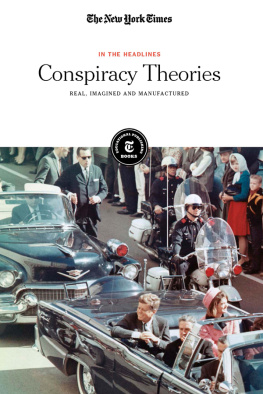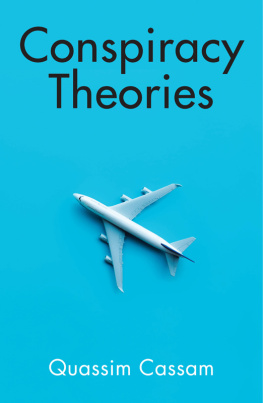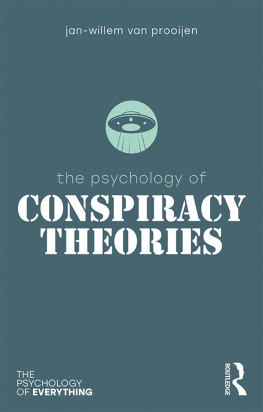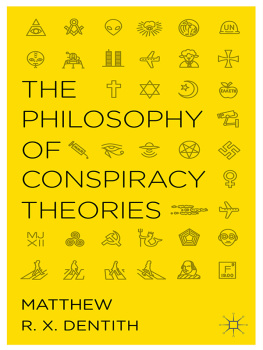Brought to you by KeVkRaY
Distributed by the Penguin Group:
Penguin Books Ltd. 80 Strand, London, WC2R 0RL
The publishers and authors have done their best to ensure the accuracy and currency of all information in The Rough Guide to Conspiracy Theories ; however, they can accept no responsibility for any loss or inconvenience sustained by any reader as a result of its information or advice.
No part of this guide may be reproduced in any form without permission from the publisher except for the quotation of brief passages in reviews.
James McConnachie and Robin Tudge, 2008
ISBN 13: 978-1-85828-281-7
This Digital Edition published 2010. ISBN: 9781848367616
E-Book format prepared by DK Digital, London and DK Digital Media, Delhi.
Introduction
To conspire once meant to breathe together. It is an image of the most intimate and secretive complicity, perfectly conjuring smoky political backrooms, sinister whisperings and passionate plots. Today, conspiracy means a very particular kind of plan. It must involve more than one person no lone gunman can make up a conspiracy of one. It must have goals that are either criminal, hostile or nefariously political no one can conspire to forgive Third World debt or feed the homeless. And it must be secret conspirators do not announce their manifestos to the world.
And I began to question everything around me: the houses, the shop signs, the clouds in the sky, and the engravings in the library, asking them to tell me not their superficial story but another, deeper story, which they surely were hiding.
Umberto Eco, Foucaults Pendulum
But this is a guide not to conspiracies , but to conspiracy theories . It doesnt freshly unveil hidden agendas or dramatically unmask sinister conspirators though theres endless material here that you wont easily find published elsewhere. It doesnt presume to tell you who really shot JFK, whether Princess Dianas car crash was definitely an accident or if Neil Armstrong actually walked on the moon. We dont announce the Truth According to Rough Guides. Instead, this guide presents the world according to conspiracists , unleashing accusations, allegations and extreme explanations that are by turns brilliant, absurd, insightful, witty, nonsensical and sometimes outright insane.
Some of the authors, journalists, bloggers and whistleblowers this guide cites believe their own theories passionately, while others undoubtedly have hidden reasons for claiming what they do. Some are even accused (by other conspiracy theorists) of being the public face of a conspiracy to discredit conspiracy theories. Many just revel in the sheer creative and iconoclastic energy of the conspiracist world. Either way, they are all given plenty of rope here. Some inevitably hang themselves with others weve been delighted to give a gentle tug. But readers should beware: even where we havent explicitly challenged or ridiculed a particular theory (after all, we cant begin every sentence with supposedly or allegedly) it doesnt mean we think its true or that we are presenting it as the truth. Of course there are a few exceptions and for the avoidance of doubt lets name them explicitly: the politically motivated plots to kill Fidel Castro, the IranContra affair, the barely legal rigging of the US presidential election in 1876 and, most heinously, the Nazi conspiracy to murder millions of European Jews despite the disturbingly motivated attempts of Holocaust deniers to claim that this is the worlds greatest conspiracy theory, rather than an actual conspiracy. We can also add to these some conspiracies to provoke conflict and blame it on an opposing party: Hitler in Poland, and the US in respect of the Gulf of Tonkin incident in Vietnam. With all the other theories in this guide, again, beware! Though we have tried to be open-minded and judicious while seeking out the best-substantiated accounts of events, that still doesnt mean you should treat any of the other theories (or any of the facts related by us in our discussion of them) with anything other than complete disbelief.
But its not always easy to stay dry and rational. Entering the world of conspiracy theories can be as disorientating as, say, underwater diving. Once youve left behind the reassuringly two-dimensional dry land of believing what the government or the media or indeed anyone else tells you, youre in a new and infinitely more complex world. Its hard to keep track of where youre heading, or even to know whether youre facing up or down. Everybody seems to have an agenda, no one can be trusted your field of vision is constricted by the mask of ideology, and looking down into the murkier depths, its easy to give way to panic and paranoia. And this is not the only danger: its just as easy to be lured by the seductive intricacy of the conspiracy reef; stay down too long, and you may succumb to a fatal narcosis. As Umberto Eco puts it in Foucaults Pendulum , one of the great conspiracist novels, conspiracy theorists are people lost in a maze: some choose one path, some another; some shout for help, and theres no telling if the replies they hear are other voices or the echo of their own. Calling for help underwater is still lonelier.
In a postmodern world where one version of history is supposedly as valid as another, conspiracy theories are often treated as a kind of game, or as the flowering of a fascinating but ultimately irrelevant subculture. Does it matter who believes what about JFK any more? Is it even possible to know what really happened? This guide may, of course, lead you to think that to dismiss conspiracy theories is the greatest danger of all. You only have to look at the anti-Semitic Blood Libel (which is perhaps the longest-lived conspiracy theory of all) or the fraudulent screed known as The Protocols of the Elders of Zion (which is perhaps the most internationally widespread) to see how conspiracy theories can be supremely dangerous. It could be said that the Holocaust was allowed to happen only because ordinary German people had been persuaded that the Jews were a genuine threat.
Nazi Germany was, admittedly, one of historys most conspiracist regimes. But other totalitarian governments Fascist Italy, Soviet Russia, Cuba and many contemporary Middle Eastern states, for example have been equally conspiracist in their thinking. (In the case of Cuba, of course, this has been largely justified.) Perhaps Hitler saw the world as a conspiracy because he himself behaved like a conspirator. Perhaps whipping up fear of external (or, better still, internal) threats is simply the best way to suppress dissent: just ask Senator Joseph McCarthy or President George W. Bush.
It is curious that the majority of conspiracy theories seem to emanate from the right notably when right-wing beliefs are combined with fundamentalist religion. Extremist Muslims and ultra-evangelical Christians share much in this respect. It seems that people with absolutist, black-and-white world-views tend to believe that the powerful operate in an equally absolutist way. People who desire patriarchal governments cannot conceive that their opponents might not act in a patriarchal way. If a political enemy is seen as basically evil rather than, say, misguided or incompetent then all their actions must surely be the result of sinister machinations. And all accidents are, therefore, the result of conspiracy, not cock-up.
Liberals or left-wingers prefer to imagine that they are above nave conspiracist thinking, that they are relative sophisticates who understand the real workings of government socialism grew out of Marxs profoundly intellectual analysis of history, after all. And yet the further left you go, the more conspiracist thinking creeps in. Anti-globalization campaigners typically caricature the workings of Western governments or multinational institutions as profoundly conspiratorial, and ultra-liberals and fascists alike share a belief in the corporate capture of politics.

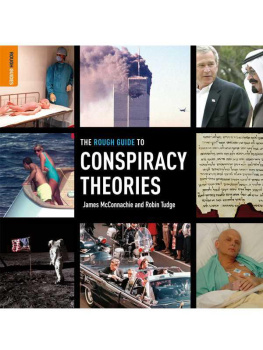
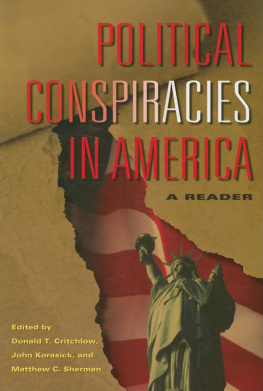
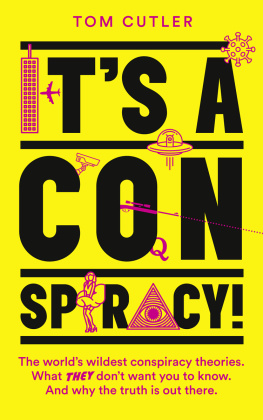
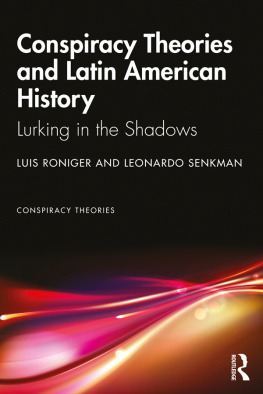
![Monte Cook - The Skeptics Guide to Conspiracies: From the Knights Templar to the JFK Assassination: Uncovering the [Real] Truth Behind the Worlds Most Controversial Conspiracy Theories](/uploads/posts/book/346601/thumbs/monte-cook-the-skeptic-s-guide-to-conspiracies.jpg)
